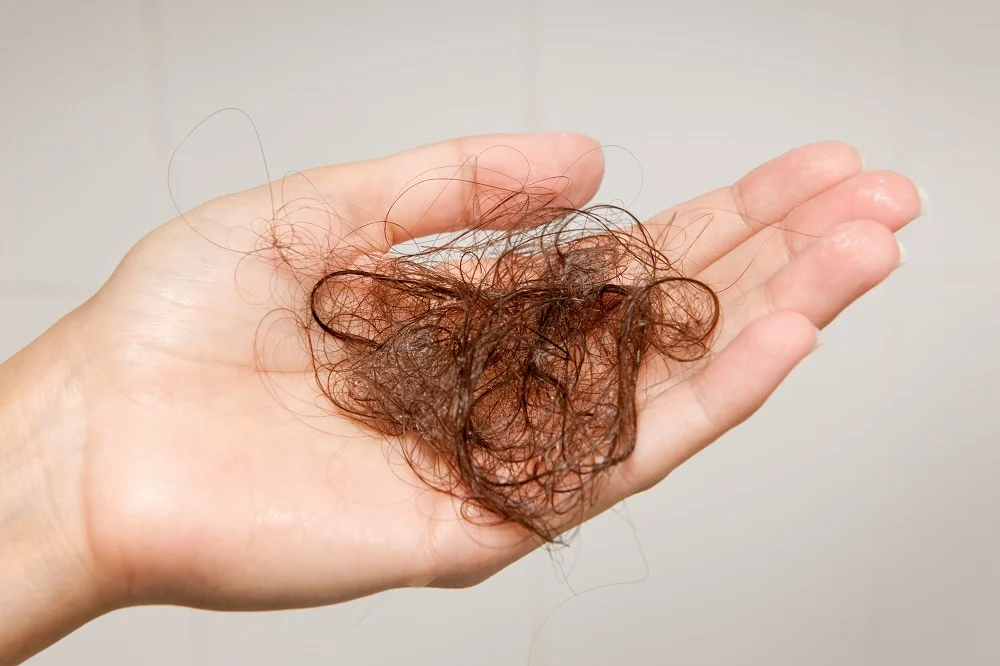Do the hot summer months make you take notice of your hair more? Does it seem like you have more hair in the shower drain or your hairbrush lately? This abundance of loose hair could be due to the time of year.
You might have heard about summer hair loss if you talk to others who worry about excessive shedding.
Summer Hair Loss: Is It Real?

If you complain about hair loss and your friend tells you it is just summer hair loss, you may wonder if it is accurate. Although not everyone will see the effects of this phenomenon, summer hair loss can be a condition for many individuals.
Thankfully, it does not last forever, although it may seem never ending when you see stray hairs around your home. Seasonal hair loss will typically take two to three months on average.
Does Hair Shed More in Summer or Winter?
Some individuals may wonder if they have more hair loss in the summer or winter. Of course, you consistently shed your hair any day of the year, but many people notice it more during the warmer days.
This observation is factual: losing more hair during the summer is quite common for men and women.
Why Do You Lose More Hair in the Summer?

We lose more hair during the hot summer months for several reasons. The average person typically sheds between 50 to 100 hair strands daily, but that number can increase by 50% in the summertime.
Some causes for seeing more hair in your shower drain in the summer include:
- Temperature changes
- UV exposure
- Salt water and chlorine exposure
- Hormones and growth cycle
Temperature Changes
When you experience temperature changes in your environment that come with the rising heat, hair loss is more probable. The reason is that drastic temperature alterations can stress your hair follicles and scalp.
UV Exposure
Although vitamin D benefits your health, too much UV exposure from the sun can affect your hair. As a result, you may notice your hair strands lighten and dry out, and you experience dandruff or dry scalp, leading to hair loss.
Salt Water and Chlorine Exposure
The hot summer months can bring long days at the beach or beside the pool. Unfortunately, prolonged exposure to salt water and chlorine can increase hair loss. In addition, these elements will dry your scalp and hair, which can cause breakage and loss.
Hormones and Growth Cycle
The rising temperatures can directly impact your hormones. With unbalanced hormone levels, including melatonin, thyroid hormones, testosterone, estrogen, and prolactin, your body will naturally lose more hair strands.
Your body produces the hormone dihydrotestosterone (DHT) as a by-product of testosterone. Higher levels in the body affect the follicles by minimizing them, and your hair stops growing and falls out.
Your hair’s growth cycle has three phases: anagen (growth), catagen ( transition), and telogen (resting). Once your hair strand has been in its resting phase for four to six weeks, it sheds from the follicle. As you go through these phases, they often line up in the spring, so shedding occurs during the summer.
How To Prevent Hair Loss in the Summer

Even though you cannot fight the shedding, you can take some precautions that may help to minimize the effects you see during the summer months. Even though it may not stop the hair loss completely, you might be able to slow it down with these tips and products.
Some simple maintenance tips include:
- Stay hydrated
- Do not brush wet hair
- Eat enough protein
- Wear a hat while out in direct sunlight
- Avoid hot styling tools
- Routine evening brushing to distribute your hair’s natural oils
- Refrain from excessive coloring or bleaching hair during the summer
Some terrific products to help prevent hair loss in the summer are:
- Nutritional supplements like biotin (B7), collagen, iron, and zinc
- Sulfate and paraben-free shampoos and conditioners
- High-quality hair masks every two to four weeks
Other ways to help minimize hair loss and keep your locks healthy include:
- Use a satin or silk pillowcase
- Avoid tying or braiding wet hair
- Minimize time spent in air-conditioned rooms
- Do not use tight hairstyles
When To Consult a Doctor?

Sometimes summer hair loss is more significant than a short summer shedding routine. An underlying medical condition may be the cause of excessive hair loss happens despite a good diet.
It may be time to consult your doctor if you have concerns about your hair in these circumstances:
- Excessive hair loss all year long.
- Dominant areas of hair loss, including the hairline, at the temples, or in patches.
- More loose hairs than usual.
While some individuals will visit their general practitioner, sometimes a dermatologist is better suited to help diagnose and treat severe hair loss. Depending on your location, you may require a referral to a clinic, so talking to your doctor can give you an idea of the treatment plans available.
Facing hair loss can cause anxiety for men and women at any age. Thankfully, shedding hair occurs as a normal part of life. Although you may notice more hair coming out during summer, it is natural.
Keeping your hair and scalp clean and moisturized can help minimize the harmful effects during summer. Protect your head from harmful UV rays and use gentle hair products to keep your scalp and hair hydrated and protected.
Remember, if you still have concerns about excessive hair loss in the summer or throughout the year, it is best to consult your local doctor.
